
Kids say the darnedest things. But their mental fortitude is even more impressive.
After recently losing his first basketball game by a whopping 12 buckets, my son Max (pictured) turned to one of his teammates and said, “It’s okay—we’re still cool.”
His mother and I laughed, of course. But it was obvious this friend was familiar with the sentiment. We asked Max about it later. He said he and his friends often say this to each other whenever they screw up.
I love this mentality. We all make mistakes. But that doesn’t diminish our value, Max says. Brilliant!

What happens when two Hollywood actors who know nothing about soccer buy a middling pro team in Wales? GQ’s Tom Lamont spent a season following football’s newest fans to find out. “Maybe we don’t make it all the way to the Premier League,” Reynolds allowed, “but if this club is promoted, once, twice, that’s epic, right? That’s history.” Continue reading…
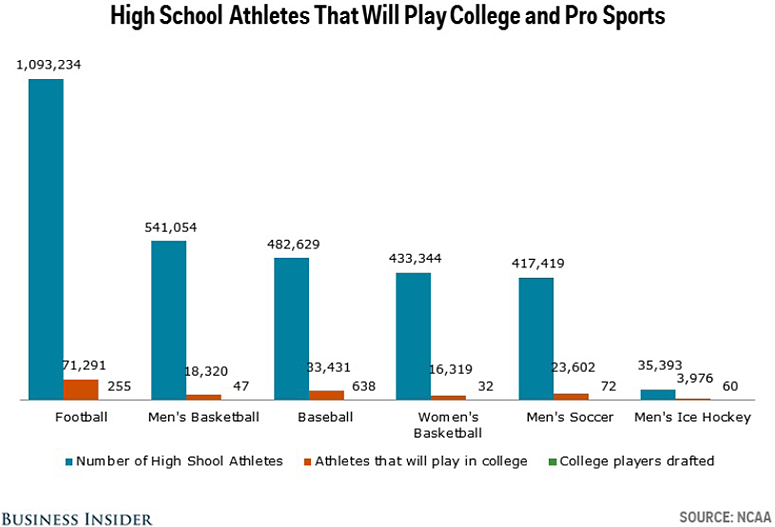
To many boys (and some girls), professional athletes are modern-day heroes. Iconic celebrities with fame, fortune, and power. What wide-eye youth wouldn’t want the same?
Turns out, a lot of them do. (With oversized Bo Jackson and Michael Jordan posters adorning my childhood walls, I certainly did.) But as with all desirable things in life, getting paid to play sports isn’t easy.
In fact, the odds are downright nasty for aspiring players, according to new data from the NCAA.
Continue reading…
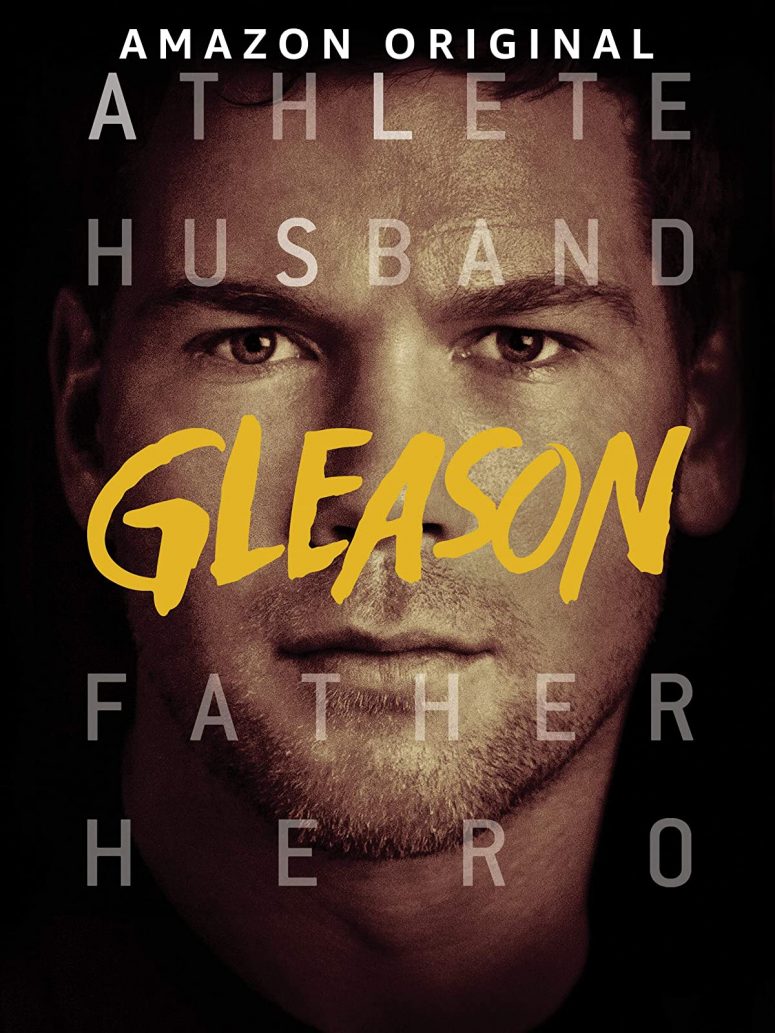
I highly recommend this deeply personal true story about a football player who loses control of his body while raising his first son. 4/5 stars

Facing your fears is never easy. It doesn’t get easier with age.
My wife and I were talking about facing our fears recently with our daughter Sadie. She runs on the track team but it makes her nervous, as any track athlete well knows. We complimented her for running, which is a painful event at the speeds track runs.
Quick backstory: Sadie finished second in the state of Utah while running the mile in grade school. Nevertheless, she was so scared she’d finish last in her first high school meet, that she didn’t even register for the mile. She chose sprints instead and got blown away. That’s what happens when distance runners run sprints.
Anyways, her mother and I encouraged her to run the mile, 400, and 800 next time. She accepted the challenge (we didn’t force her), and she registered for all three events at her next meet. She was visibly nervous for the full week leading up to the big day. Continue reading…

Courtesy Shutterstock
Although unusual elsewhere in the world, the United States is very patriotic and proud when it comes to commencing athletic events with its own national anthem. Why is that?
In this excellent 12 minute report by Cheddar, it’s fascinating to see how the tradition took root, and how it might change (or not) in the coming years.
My personal opinion: I like the sporting staple and don’t think it’s overplayed, since most people only participate in it when in person or during big televised events such as the Super Bowl or Olympics.
The rest of the time we mostly skip it, which keeps the anthem from becoming blasé (unless of course your one of the rare athletes that hears it before every game).
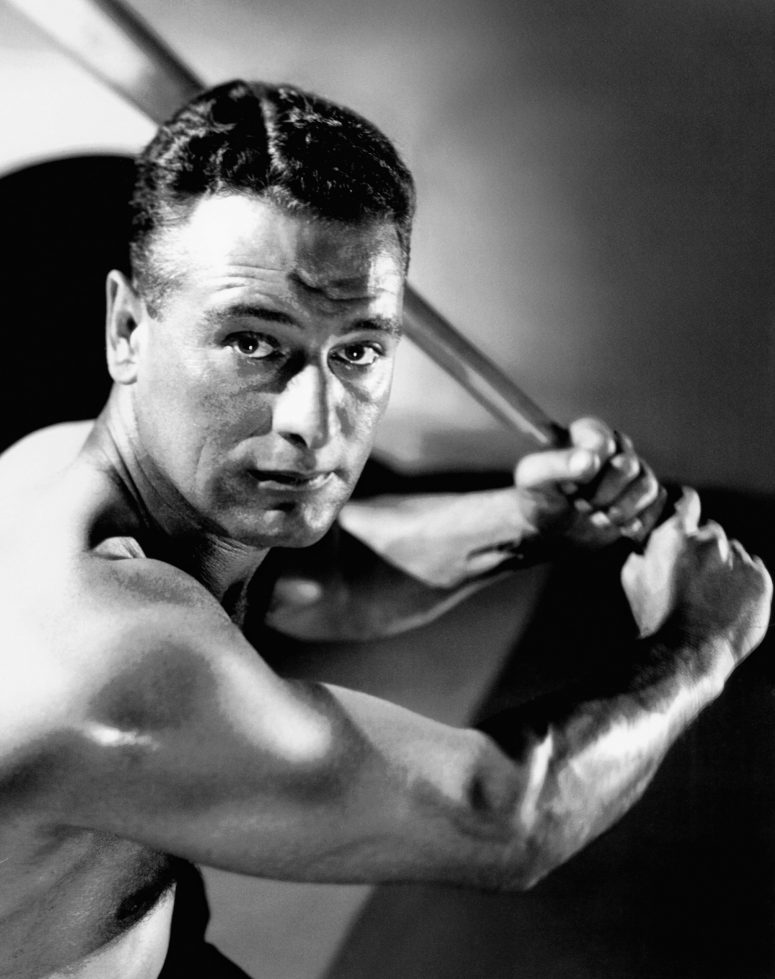
This is a fantastic long-read by Louis Menand about how baseball players turned athletes into the sponsored celebrities we know them as today. “He signed his first client in 1921. And that client turned out to be the greatest sports figure of his day, or possibly, with the exception of Muhammad Ali, of any day: Babe Ruth. Ruth didn’t just do what every ballplayer did but better. On the field and off, he was in a class by himself.”
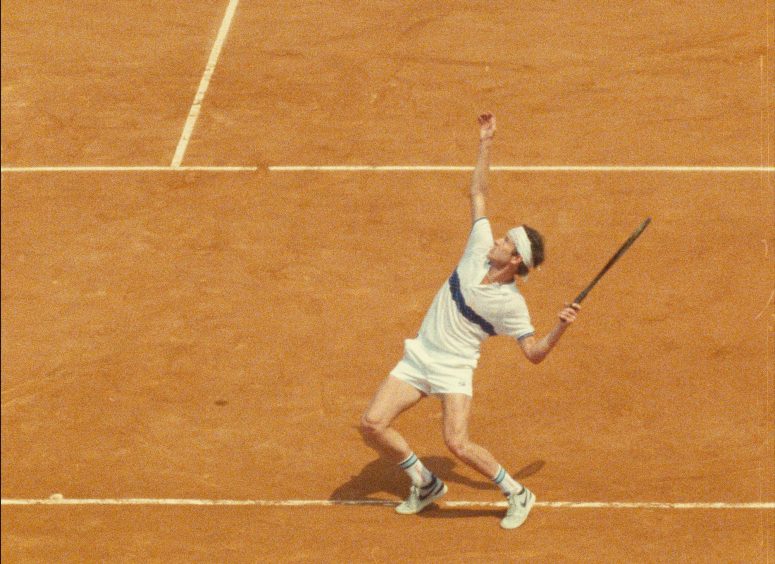
Years ago I read one of the greatest sports biographies ever: You Cannot Be Serious by John McEnroe. You should read it.
Last week I watched one of the best sports documentaries I’ve ever seen: John McEnroe: In The Realm of Perfection.
Now before you write me off as a McEnroe fanboy, which I unabashedly am, please know that the latter is a French documentary about a controversial American tennis brat in his prime.
Shot mostly in slow motion, it is a quirky and mesmerizing film with a powerful finish that convincingly argues that a tennis match is good cinema, and that McEnroe was arguably the sports best “directors” of tennis cinema.
Four stars out of five.
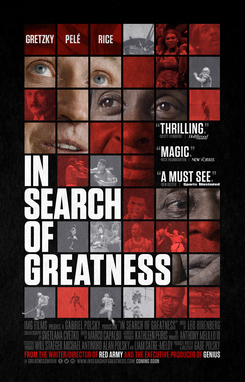 I recently watched In Search of Greatness and learned a lot.
I recently watched In Search of Greatness and learned a lot.
The documentary makes a convincing argument that structured specialization prevents our children from achieving greatness, especially in athletics, but also in other disciplines.
After interviewing and examining the upbringing and work ethic of over a dozen all-star athletes and musicians, the movie concludes that if you want your child to be great, raise them on a well-rounded diet of interests and physical activities. Do this until at least late high school or even college in some cases. Only then should children focus and devote the majority of their time to one pursuit.
Although it seems counter-intuitive, the filmmakers argue that this strategy allows our youth to play by different rules and see things differently. And there’s strong evidence suggesting this cannot be done if aspiring athletics, musicians, and others are strictly raised on only speciality from a young age, which is increasingly the norm now. That’s bad because youth specialization stifles their creativity and innovation and prevents them from developing other muscles and talents that can have a positive crossover effect on their primary passion.
I buy it. Four stars out of five.
See also: How children succeed: 5 things to know

Long Beach, CA
I visited Austin and Tucson earlier this year and was surprised by their size and subsequent lack of professional sports, which hurts their notoriety and familiarity in an otherwise sports-crazed nation.
Meanwhile, Green Bay, Wisconsin—home of the well-known Packers—is the smallest city in America with a pro sports team (just 100,000 residents).
What other large cities might fly under the radar, then, due to a lack of professional sports?
This is what I found—the largest U.S. cities without a pro team: Continue reading…
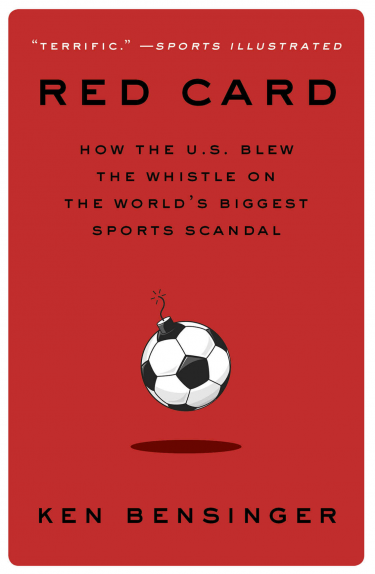 I feasted upon and finished reading Red Card: How the U.S. Blew the Whistle on the World’s Biggest Sports Scandal in just two days.
I feasted upon and finished reading Red Card: How the U.S. Blew the Whistle on the World’s Biggest Sports Scandal in just two days.
Although I’m a devoted World Cup fan, you don’t have to be a soccer fan to enjoy it. The hard-to-believe true story, mob-like drama, and lavish chicanery are more than enough to keep the average reader interested.
Written by Ken Bensinger, a wonderful wordsmith and storyteller, the book is the most well-researched non-fiction I’ve encountered since Hillenbrand’s Seabiscuit or Unbroken.
For its ability to show how bribery hurts everyone except the few involved, I highly recommend it.
Four stars out of five.
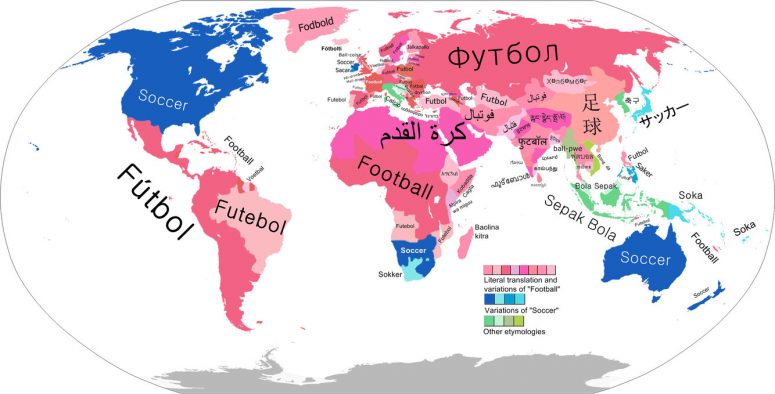
Courtesy Reddit
In fact, Irish, South Africans, Canadians, Australians, Kiwis, and even four-time World Cup champions Italy call the sport something other than “football.” In addition to America, the first five say “soccer,” while the latter call it “kick ball.”
As for how “soccer” got it’s name, the English actually invented it, according to the U.S. Embassy in London:
“Soccer’s etymology is not American but British. It comes from an abbreviation for Association Football, the official name of the sport. For obvious reasons, English newspapers in the 1880s couldn’t use the first three letters of Association as an abbreviation, so they took the next syllable, S-O-C. With the British penchant for adding ‘-er’ at the end of words—punter, footballer, copper, and rugger—the word ‘soccer’ was born, over a hundred years ago, in England, the home of soccer. Americans adopted it and kept using it because we have our own indigenous sport called football.”
There you have it. Don’t like the name “soccer,” blame the British.

Courtesy Wikimedia Commons
Last summer, I was invited to play a game I had never heard of: “Pickleball,” a regional sport that resembles tennis on smaller courts but is played with paddles (like table tennis) and a specialized wiffle ball that travels much slower than either tennis or ping pong balls. This makes the game easier to pick up and ultimately compete against more advanced players, something neither tennis or ping pong are good at.
Admittedly, it may sound boring and look peculiar. But over the last four months of playing, I’ve become an enthusiastic participant, devoted fan, and happily retired tennis player who now plays pickleball upwards of twice a week. I’m not the only one. Continue reading…

For the record, I don’t consider myself a great writer. I’m certainly an effective, efficient, and sometimes amusing one. But I wouldn’t say great. The below, on the other hand, written by my friend Davey Saunders and published with his permission is great. I hope you enjoy it.
Continue reading…
[youtube]https://www.youtube.com/watch?v=CEVdca9U9LM[/youtube]
Over the last decade, I’ve mostly written about technology. Among the hundreds of magazine articles and thousands of blog posts published, some cover entertainment. Some science. Some travel. And rarer still, some sports. (All topics that personally appeal to me.)
Of the latter category, these are the stories I’m most proud of, along with the backstories that created them. Continue reading…
 With two games remaining, my daughter’s soccer team is in second place. They’ve won nine games and lost one to the third place side which—while not as talented—understands that successful passing leads to more goals than successful dribbling or individuality. In other words, they play as a team more than my daughter’s side.
With two games remaining, my daughter’s soccer team is in second place. They’ve won nine games and lost one to the third place side which—while not as talented—understands that successful passing leads to more goals than successful dribbling or individuality. In other words, they play as a team more than my daughter’s side.
That same team has likely dropped more games than the three and a half players that impressively carry my daughter’s club because playing as a team for every game is difficult to achieve. It’s easier for great players to show up to every game than a reliable team.
In any case, my daughter’s “club” will square off against the first place team this weekend, and I suspect they’ll lose unless they listen to Michael Jordan: “Talent wins games, teamwork wins championships.”
To inspire more passing, teamwork, and selflessness, I hope they’ll consider my favorite quotes on teamwork as much as you might. They are as follows: Continue reading…

Football began in earnest last week. Not that kind. The oblong American kind. The “hoorah!” kind.
For now, I couldn’t be happier. BYU‘s undefeated and ranked 25th in the country. Seahawks look dominant enough to repeat as Superbowl champions. And even the most jaded fans are full of hope, smiles, and optimism right now. That always makes the world a more enjoyable place to live.
Of course, that’ll change as the season wears on. For most of us, frowns are just around the corner. But there’s a simple trick I’ve learned over the years to avoid letting an uncompetitive or unlucky sportsball team ruin your night, day, week, month, autumn, or even year. It is this: Embrace fair weather fan status. Be proud of it. Bandwagons are fun.
Continue reading…
 For the next month, soccer fans watching the World Cup will see more fake injuries than any amount of magic spray could possibly cure. And by fake I mean diving, flopping, conniving—temporarily feigning injury in an effort to draw an advantageous ruling on the field.
For the next month, soccer fans watching the World Cup will see more fake injuries than any amount of magic spray could possibly cure. And by fake I mean diving, flopping, conniving—temporarily feigning injury in an effort to draw an advantageous ruling on the field.
Although seen in international soccer with regularity, diving during the World Cup happens in greater frequency because the stakes are higher. (This is the world championship, after all, held once every four years.) And when the stakes are higher, cowardice teams will employ anything they can for an edge.
“In the British game, it is often seen as an import from foreign players,” says psychologist Paul Morris, who studies diving at the University of Portsmouth. “Many people argue that it has been common in Italian football for decades.” Continue reading…
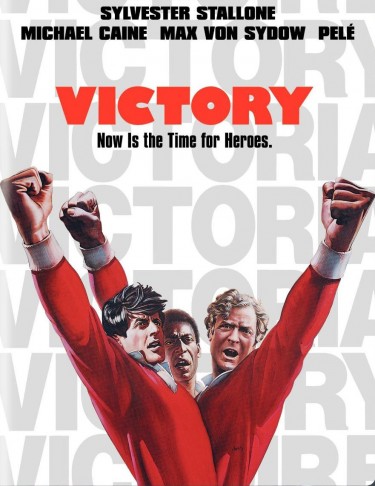
Paramount
In honor of the World Cup, which starts next week in Brazil, here’s how I fell in love with the game.
The year: 198X. I was at a friend’s house in a remote part of northern Oklahoma. We were watching Victory, a so-so Sylvester Stallone movie about a POW soccer team playing Nazi Germany during World War II. My buddy and I were no older than five or six at the time.
Not wanting to endure the feeble character and pre-game drama, we fast forwarded the VHS “through all the boring stuff” to get right to the climatic game. While the build up to said game will likely keep most adults engaged — more for its interesting plot than acting skills — the last 20 minutes of the movie is most triumphant.
Continue reading…
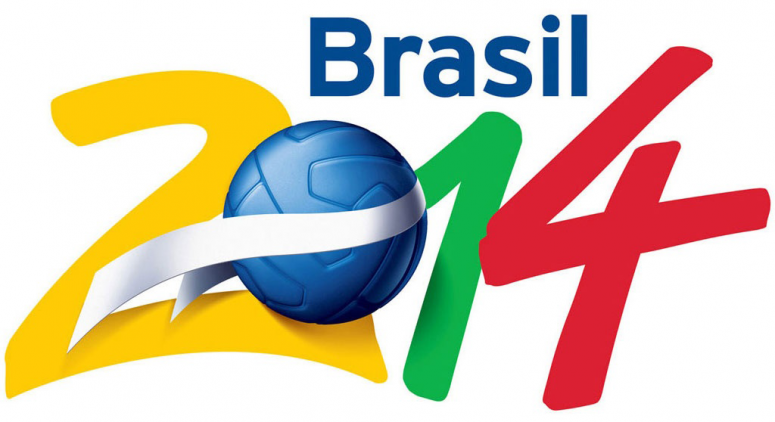
The World Cup starts anew this week in Brazil. If the past is any indication, there’s an 83% chance Brazil, Argentina, Italy, Germany, and/or the Netherlands will make the final. What do these countries have that others don’t?
“Of the factors that contribute, none is, necessarily, a prerequisite,” writes Gabriele Marcotti for ESPN. “But the more of the seven ingredients below you have in your shopping cart, the more likely you are to win a World Cup.” Continue reading…
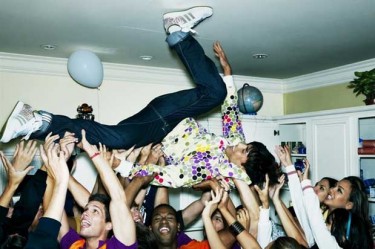
The Scrib
In other words, you don’t do if for the money.
“The Brazilian World Cup is best understood as a party,” writes Simon Kuper for ESPN. “You don’t host a party to get rich. You do it to have fun, and Brazilians will have fun. Yet there’s something obscene about hosting an extravagant party in a country where millions of people need houses, electricity, doctors. That’s what bothered the protestors.”
Politics aside, there are measurable increases in happiness among a host nation’s citizens, according to Soccernomics. Not unlike the effect a good house party has on a host.
But you can still skimp on a party and have a good time. The problem is, I think the Olympics and FIFA always want a lavish party, even if the designated host can’t afford it.
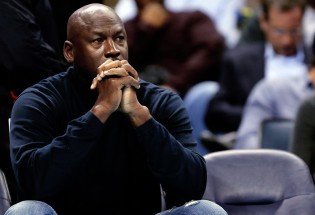 For example, his recent profile on Michael Jordan turning 50 goes to a place few sportswriters go: Deep thoughts.
For example, his recent profile on Michael Jordan turning 50 goes to a place few sportswriters go: Deep thoughts.
Aging means losing things, and not just eyesight and flexibility. It means watching the accomplishments of your youth be diminished, maybe in your own eyes through perspective, maybe in the eyes of others through cultural amnesia. Most people live anonymous lives, and when they grow old and die, any record of their existence is blown away. They’re forgotten, some more slowly than others, but eventually it happens to virtually everyone. Yet for the few people in each generation who reach the very pinnacle of fame and achievement, a mirage flickers: immortality. They come to believe in it. Even after Jordan is gone, he knows people will remember him. Here lies the greatest basketball player of all time. That’s his epitaph. When he walked off the court for the last time, he must have believed that nothing could ever diminish what he’d done. That knowledge would be his shield against aging.
Beautiful. More here.

A lot of rabid olympic spectators in America are understandably upset. NBC has spoiled the tape-delayed results on more than one occasion, either with an evening newscast or even a promotional commercial in between events which announce interviews with eventual gold medalists that still haven’t won on tape delay.
Worse still for cord-cutters like me, authentication of a cable subscription is required to watch events live online, even though NBC is a free broadcast channel. Even still, the live stream app reportedly crashes a lot.
At the same time, the number of people watching NBC’s olympic prime-time and tape-delayed coverage is off the charts. Record ratings even. NBC’s tape delayed approach is even boosting they’re revenue, so they’re approach is obviously working, even if it upsets a lot of people.
So why is everyone so pissed off, and by everyone I really mean just a loud vocal minority? Continue reading…
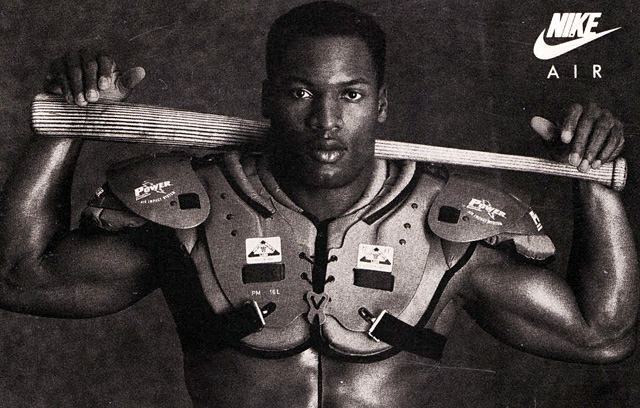
I owned my fair share of Air Jordans growing up. But as a jack of all trades, I always had a soft spot for Bo Jackson, his amazing talent, and his cross training shoes. In fact, I probably owned more Bo Jacksons than Air Jordans. I certainly drew more cross trainers than basketball shoes.
Unfortunately, Bo Jackson was only superhuman for four years until he suffered a hip injury. But for those four years, he was arguably bigger than even Jordan, as this wonderful profile of him suggests. Bo, it turns out, really did know.
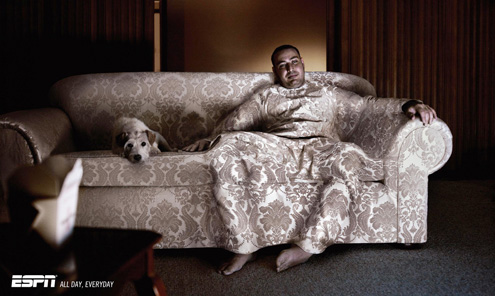
Interesting story by USA Today on how ESPN allegedly enticed the ACC to poach Pitt and Syracuse from the Big East, after the latter conference refused a TV deal from ESPN.
I suppose it’s only logical that profiteers would move to high school basketball, having already compromised professional and collegiate hoops.
That said, the below is a must-read summary for any athletic parent, youth coach, or sports fan:
A jarring look at youth basketball: Part 1 | Part 2
Note: The above story is a review of the eye-opening Play Their Hearts Out by George Dorhrmann.
Notable feature stories I’ve written recently:
Similar to Madden NFL, the cable sports network now highlights the playmaker with a under-ring (as seen 1:05 into video). Me likey.
 From NPR’s book review of Scorecasting:
From NPR’s book review of Scorecasting:
When they examined attendance data for the Cubs, one of the unluckiest teams in professional sports who have not won a World Series in 102 years, the authors found it to be remarkably stable — around 90 percent — no matter if the team was at the top of the league or on a losing streak. Fair-weather fans, it seems, actually incentivize a team to win; team owners and coaches will work harder to win games so they can sell more tickets.
Not only are fair-weather fans better for the organization, though. Being one is better for oneself, as fair-weather fans are more at liberty to chose entertainment options that “work for them,” as opposed to staying involved with a mediocre (aka boring) team.
In other words: Go, Cougars! (So long as they’re winning.)
Self-Correcting Golf Balls That Always Fly Straight (Fox)
 The money quote: “In the 75-year history of the wire service era, CBSSports.com research showed that it is nearly impossible to win a national championship at the highest level in major college football without cheating. Among the schools that have won titles since 1936, when human polls became the accepted form of determining the sport’s champion, only BYU has never had a major violation in football.”
The money quote: “In the 75-year history of the wire service era, CBSSports.com research showed that it is nearly impossible to win a national championship at the highest level in major college football without cheating. Among the schools that have won titles since 1936, when human polls became the accepted form of determining the sport’s champion, only BYU has never had a major violation in football.”
Go, Cougars!

With the 10th pick in the NBA draft, a lot of people became Sacramento Kings fans last night. I’m one of them.
Above is the kings.com homepage, updated a couple hours after Jimmer was selected. Nice welcome.
“See Jimmer live all season!”
[youtube]http://www.youtube.com/watch?v=AiAHlZVgXjk[/youtube]
But if it’s anything like the book, Moneyball should be a good movie.
[youtube]http://www.youtube.com/watch?v=hpUISVSoNOk[/youtube]
American men’s tennis has seen better days, although Roddick has kept things interesting, reaching the Wimbledon finals four times and playing in that epic match against Federer in 2009.
[youtube]http://www.youtube.com/watch?v=etm54u7MA3A&feature=player_embedded[/youtube]
But I suspect this is far to complicated to ever catch on. And how on earth are amateur, aspiring, or otherwise young players ever suppose to recreate that crazy field!?
Not gonna happen.
PS – Good luck trying to find four goalies. It’s hard enough to find two in soccer.
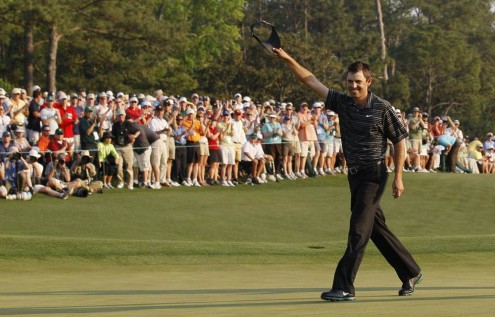
You don’t have to be a golf fan to appreciate how it went down in Georgia yesterday. My wife and I were affixed to the TV—and we never watch golf.
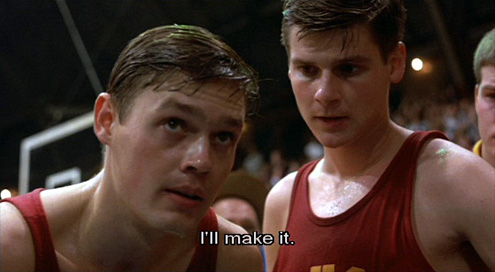
I wish I could have seen my Dad play basketball.
My uncle tells me he was a phenomenal shooter, regularly putting up 30+ points a night against amateur competition. My old man reputedly scored 50 points in a single half of intramural college ball once (!).
More impressive from a precision standpoint, he shot 50 consecutive free throws at my neighbor’s house when I was a boy. He stopped before missing his first shot so he could get home “for supper,” he says. Talk about ending on a high note.
Marveling at other great shooters this year, including Jimmer Fredette, whom I’ve watched at close range, I asked my Dad what it takes to be a great percentage shooter. His reply:
“It is a combination of natural and great physical skill, thousands of hours of practice and playing, and the ability after reaching a certain point of physical excellence to take your mind out of shooting and letting your body do it! That’s the groove that is spoken of. Not very many reach the ‘groove’ consistently. When it happens, it is like heaven on earth.”
High five, pops!
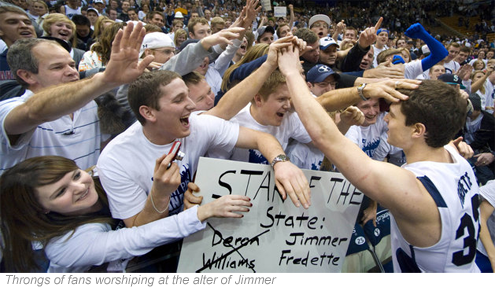
On Monday, BYU student Michelle Peralta accused fellow classmates of “idol worship” in a letter published in the school paper. Peralta, not to be confused with the awesome ’80s skateboards of the same name, said she was irritated by what she called “Jimmer worship,” Jimmer being the BYU point guard, 3-point killer, nation’s leading scorer, and all-around swell guy.
In all likelhood, Peralta, an admitted non-sports fan, was probably just venting her frustration over the increased volume of Jimmermania sweeping the nation, Provo very much included. That didn’t stop the Internet from having a little fun with her though.
In a virally large thread on her then-public, now-private Facebook page, hundreds of Jimmer fans came to his defense, while sticking with the comical spiritual theme Peralta had started. Here my top 10 favorites: Continue reading…
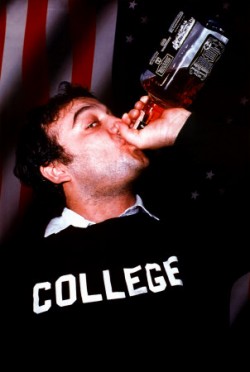 As the value of higher education continues to decline, these are some great alternatives: Start a business, travel the world, create art, make people laugh, write a book, work for a charity, master a game, master a sport. Splendid!
As the value of higher education continues to decline, these are some great alternatives: Start a business, travel the world, create art, make people laugh, write a book, work for a charity, master a game, master a sport. Splendid!
 One of six fabled BCS computers, not unlike something you’d use to surf YouTube.
One of six fabled BCS computers, not unlike something you’d use to surf YouTube.
My latest for Wired Magazine. Bang. (also syndicated on CNN and Gizmodo)
[youtube]http://www.youtube.com/watch?v=jE4Fcl7oGQc[/youtube]
Mixing camping with must-see TV?
Honestly, how much could this fan be “enjoying” a game of football on a three inch screen while camping, especially since he probably has 50″ HDTV at home? Grow a pair and pick one: Get away from it all in the great outdoors or stay home to watch a game you’re really interested in. Or if you must, DVR.
Seriously, what kind of sick society are we turning into? The equation is simple.
See also:
[youtube]http://www.youtube.com/watch?v=idA9Vym1F54[/youtube]
It was the ’80s or ’90s. It moved at a faster pace because officials actually let the players play, unlike today. And uh, as the above video shows, it was a lot more physical. Good times. (Thanks, Tim).
Link here
Because they’re constantly chaperoning 120 players, “most of them 18-22 years of age,” reports the Associated Press:
Joker Phillips is 47 and in his first season as Kentucky’s head coach after 20 years as an assistant. He said he has made sure to keep good habits despite the demands of the job. “I still work out every day. I still get the same amount of sleep. I just think this game is important to me, but my family and personal health is more important,” he said. “I am a competitor and I do want to win, but I’m not going to let this game ruin my life.”
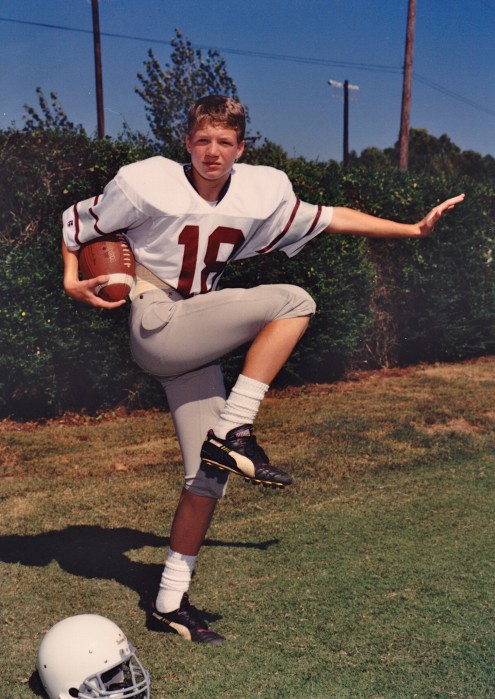
Photographer had me pose like that because I was a running back. Or at least I tried to be.
Fun fact: Those Puma “soccer” cleats are actually hand-me-downs from my older brother—an understandable side effect of growing up with five siblings.
Photo taken in 1993, after numerous bouts of Bull in the Ring. Image courtesy Cathy Snow (Hi, Mom!)

I’m not crazy about their using corn sweeteners. And they won’t make you jump higher or run faster. But sports drinks (read: bottled sugar water) such as Gatorade and Powerade actually work when it comes to endurance boosts. Marathoners know this, as does this new study by the University of Edinburgh.
Scientists discovered that 12 to 14-year-olds could play for almost a quarter longer during team games when they drank an isotonic sports drink before and during games. The sports drink helped the adolescents continue exercising for up to 24% longer than those who were given a non-carbohydrate placebo drink.
To be clear, you can make homemade sports drinks that are nearly as effective. Just mix water with a little sugar, some flavoring, and a dash of salt. (Most isotonic drinks are a 6% carbohydrate-electrolyte solution.)
They key is to know when to reach for sports drinks over good old water. And all the research I’ve read suggests water is more than suitable for workouts under an hour. Anything longer than that and your body will benefit from the extra dose of electrolytes, carbs, sugar, and salt.
I know mine does during long distance runs.
See also: Top 5 Powerade flavors
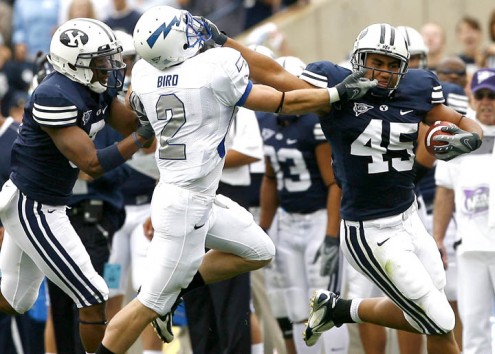
If you like learning about things like shoulder stripes, face guard colors, and all things football fashion, this is a must-read. There’s even a little trivia. Case in point: of the 120 top divisional schools, only two teams wear white at home: LSU and Georgia Tech (Go, Jackets!).
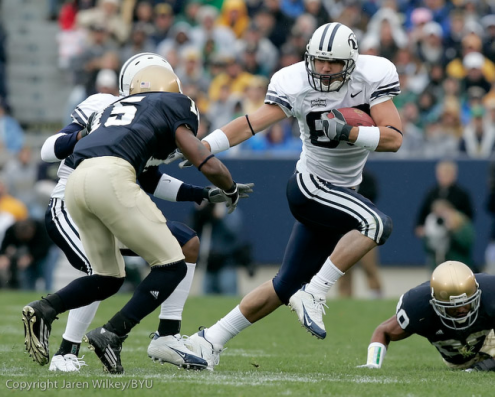
Go, Cougars! Protect this house. Show them You-Dubs who’s boss.
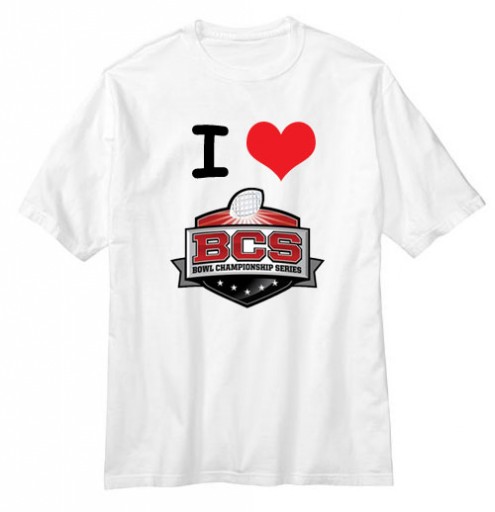 Wink, wink.
Wink, wink.
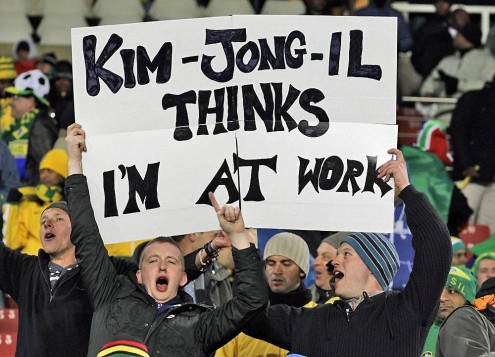 More here
More here









 I recently watched
I recently watched 




 With two games remaining, my daughter’s soccer team is in second place. They’ve won nine games and lost one to the third place side which—while not as talented—understands that successful passing leads to more goals than successful dribbling or individuality. In other words, they play as a team more than my daughter’s side.
With two games remaining, my daughter’s soccer team is in second place. They’ve won nine games and lost one to the third place side which—while not as talented—understands that successful passing leads to more goals than successful dribbling or individuality. In other words, they play as a team more than my daughter’s side.
 For the next month, soccer fans watching the World Cup will see more fake injuries than any amount of
For the next month, soccer fans watching the World Cup will see more fake injuries than any amount of 


 For example, his
For example, his 


 From NPR’s
From NPR’s  The money quote: “In the 75-year history of the wire service era,
The money quote: “In the 75-year history of the wire service era, 



 As the value of higher education continues to decline,
As the value of higher education continues to decline,  One of six fabled BCS computers, not unlike something you’d use to surf YouTube.
One of six fabled BCS computers, not unlike something you’d use to surf YouTube.




